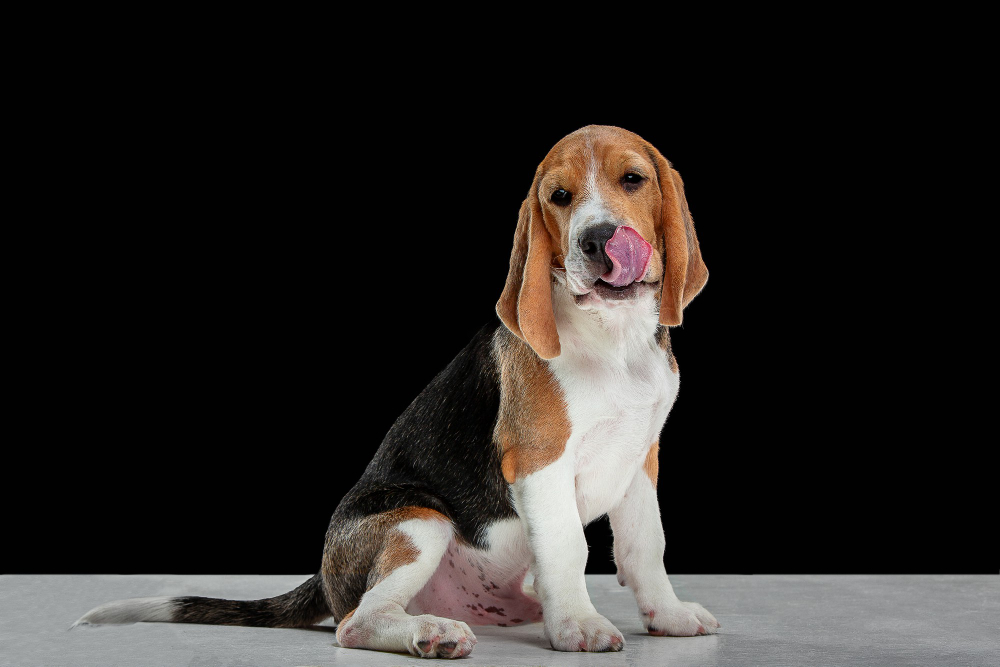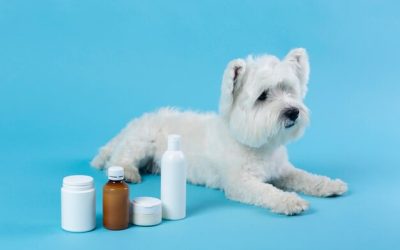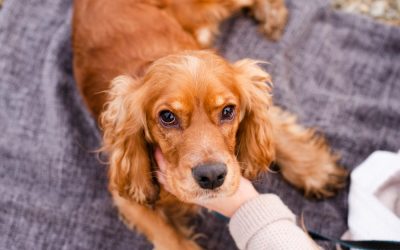Why Does My Dog Keep Licking His Bum and Tail?

Updated October 13, 2025
If you’ve ever noticed your dog licking their bum or tail more often than usual, you’re not alone, and it’s usually not as odd as it may seem. Dogs explore their world in many ways, and licking is one of their most instinctive behaviors. While occasional licking is normal and part of a dog’s self-care routine, there are times when it might signal something more serious. Understanding what’s behind this habit can help you keep your furry friend happy and healthy.
Why Dogs Lick: More Than Just Grooming
Licking plays a significant role in how dogs care for themselves. Just like we might scratch an itch or adjust our clothing, dogs use their tongues to deal with minor irritations or to stay clean. So a little bum-licking now and then is perfectly natural.
But if you’re seeing it happen frequently or obsessively, it could be a sign that your dog is feeling uncomfortable—or that there’s an underlying health or behavioral issue that needs your attention.
Common Reasons Dogs Lick Their Rear Ends
Understanding the most likely causes behind this behavior can help you decide if it’s something to watch—or something that needs veterinary care.
Grooming Habits
Dogs naturally groom themselves using their tongues. If the behavior is occasional and your dog seems otherwise healthy and relaxed, this is usually nothing to worry about.
Anal Gland Discomfort
Dogs have small glands near their rectum that sometimes become impacted or infected. When this happens, dogs might lick the area to relieve pressure or irritation. If you notice your dog scooting or showing signs of discomfort, a vet visit may be in order.
Parasites Like Fleas or Worms
Fleas, ticks, and intestinal worms can all irritate the rear. If your dog is licking more than usual and you haven’t recently treated them for parasites, this could be the cause.
Keeping up with grooming and regular parasite prevention can go a long way in keeping your dog comfortable.
When Licking Points to a Health Concern
If the licking becomes frequent or intense, there may be a medical reason behind it.
Infections
Bacterial or yeast infections around the bum or tail can cause itchiness or discomfort. If you notice redness, swelling, or a bad odor, consult your vet for treatment options.
Inflammatory Bowel Disease (IBD)
Sometimes, dogs with IBD may lick their rear due to gastrointestinal discomfort. While not always obvious, chronic licking combined with digestive issues like diarrhea or weight loss might point to something deeper.
Lumps or Growths
Unusual lumps or swelling around your dog’s anal area should never be ignored. Even if your dog isn’t in obvious pain, a quick vet check can rule out anything serious.
Allergies and Skin Sensitivities: A Common Culprit
Just like people, dogs can suffer from allergies, and often, their skin is the first place symptoms show up.
Food Sensitivities
If your dog is licking their tail or bum persistently and you suspect food might be involved, talk to your vet about an elimination diet. Some dogs are sensitive to common ingredients like chicken, beef, or grains.
Environmental Allergies
Dust, mold, pollen, or even household cleaners can cause skin irritation, leading to excessive licking. Bathing your dog with a gentle, vet-recommended shampoo can sometimes help soothe irritated skin.
Dermatitis
Dogs with skin conditions like dermatitis may lick to relieve discomfort. If licking leads to broken skin or hair loss, it’s time to get a diagnosis and treatment plan.
When Licking Is More Than Skin Deep: Behavioral Causes
Sometimes, licking has more to do with what’s going on in your dog’s mind than in their body.
Boredom or Lack of Stimulation
Dogs left alone for long periods or who don’t get enough play and exercise may turn to licking out of boredom. Interactive toys, enrichment games, and regular walks can help redirect this behavior.
Anxiety and Stress
Just like us, dogs can feel anxious due to changes in their environment, loud noises, or separation from their people. Licking may become a way to self-soothe. Creating a calm space and offering plenty of affection can often help reduce this type of behavior.
Habitual Licking
Sometimes, a behavior that started for a valid reason (like an itch or mild irritation) sticks around as a habit, even after the cause is gone. In these cases, gentle redirection and consistency can help break the cycle.
How to Tell When It’s a Problem
So when does normal licking become something more? Here are a few signs to look out for:
- Licking is constant or obsessive.
- You notice swelling, redness, or hair loss.
- Your dog seems uncomfortable or restless.
- Other symptoms appear, like vomiting, diarrhea, or appetite changes.
If any of these sound familiar, it’s best to check in with your veterinarian.
What to Do If Your Dog Keeps Licking Their Bum
As stated by Elaine Waldorf Gewirtz in the AKC article: Some of these issues can be solved at home by cleaning the rear with canine shampoo and water or brushing the dog thoroughly. If they continue after you try this, and you can’t identify the issue yourself, it’s time to see the vet, especially if your dog’s rear is red and inflamed and shows no signs of healing on its own or after cleaning or brushing.
“To remove these irritations, do not apply diaper rash cream, as many of these over-the-counter ointments may contain zinc, petroleum, cod liver oil, or lanolin,” says Dr. Whittenburg. Licking and swallowing too much human diaper rash cream can cause intestinal upset or toxicity. These may work great for people, but they’re not meant for dogs.
“Never give any over-the-counter medications to your dog without your veterinarian’s approval,” Dr. Whittenburg says. “Many of these drugs are toxic to dogs, and others, if given, may make it impossible for your veterinarian to treat your dog due to drug interaction issues appropriately.”
How Can Pet Insurance Help You if Your Dog Needs Treatment?
Pet insurance can be a valuable tool in managing the costs of treating a dog’s veterinary expenses. By having a pet insurance policy in place, you can have peace of mind knowing that you can provide medical care for your furry companion without worrying about the financial burden. Pet insurance can help cover the costs of veterinary consultations, diagnostic tests, medications, and even specialized treatments if required.
Reimbursement
This method is the most common for pet insurance companies. You pay out of pocket for the veterinarian bill, and then the insurance company reimburses you for what’s covered under the insurance plan. The steps look like this.
- You pay the vet bill after your dog’s visit.
- You fill out the pet insurance claim form.
- Submit the claim form and other required documentation to the insurer.
- After the claim is approved, you will be reimbursed for eligible expenses.
What Does Odie Pet Insurance Cover?
Pet insurance covers various veterinary expenses, providing financial protection and peace of mind for pet owners. Here are the details of the coverage options offered by Odie Pet Insurance:
Illness & Injury Plan
The Illness & Injury Plan is an all-inclusive insurance plan designed to cover a wide range of medical needs for your pet. This plan includes comprehensive coverage for various illnesses, injuries, and veterinary services. Some of the covered items include:
- Veterinary exams and consultations
- Diagnostics (e.g., X-rays, lab tests)
- Prescribed medications
- Surgeries and hospitalization
- Rehabilitation, acupuncture, or chiropractic treatments
- Medically necessary supplies
- Euthanasia and cremation
The Wellness Plan
The Wellness Plan is a monthly membership that focuses on preventive care and covers routine veterinary services.
- Provides reimbursements for routine care items, such as wellness visits (exams and vaccines), testing and parasite prevention, dental cleanings and at-home dental care, vitamins, supplements, and more.
- Through Odie’s partnership with Petivity, a leader in smart pet products and proactive care, Wellness Plan members can also receive reimbursements for Petivity devices and health kits, as well as eligible Purina food and supplements.
- Total reimbursement up to $700 per year.
FAQs
Is it normal for dogs to lick their bum area, and when should I worry?
Occasional licking is normal grooming. Be concerned if licking becomes excessive (lasting over 20 minutes), persistent, obsessive, or accompanied by redness, swelling, hair loss, discharge, scooting, or disrupts sleep/activities. This indicates discomfort requiring attention.
What are the most common causes of excessive bum licking?
- Anal gland problems: Blocked, impacted, or infected glands causing pain and itching.
- Allergies: Flea allergy dermatitis (intense itching at the tail base), food allergies, or environmental allergies.
- Parasites: Fleas (most common), tapeworms, or other internal/external parasites.
- Skin infections: Bacterial or fungal overgrowth causing redness and inflammation.
What other conditions can cause this behavior?
Hormonal imbalances (hair loss, weight changes), orthopedic pain (lower back, hip, tail issues), behavioral problems (stress, anxiety, boredom, compulsive behavior), grooming irritation (razor burn, sanitary cuts), and contact irritants (detergents, cleaners, shampoos).
When should I see a vet, and what will they do?
Seek care if licking persists over 1-2 days, becomes obsessive, shows redness/swelling/bleeding/discharge, causes hair loss, involves scooting, or your dog seems in pain. Vets perform complete exams, check anal glands, test for parasites, assess skin infections, and may recommend bloodwork, X-rays, or allergy testing.
How are the common causes treated?
- Anal glands: Manual expression, dietary fiber (pumpkin, green beans), weight management, and antibiotics if infected.
- Allergies: Flea prevention, hypoallergenic diet trials, antihistamines, immunotherapy, medicated baths.
- Infections: Medicated shampoos, topical/oral antibiotics or antifungals, E-collar to prevent licking.
- Parasites: Prescription prevention, deworming, environmental treatment.
Does pet insurance cover this, and how can I prevent it?
Odie’s Illness & Injury Plan covers anal gland issues, skin infections, allergies, parasites, diagnostics, medications, and treatments. The Wellness Plan covers preventive care, including routine exams, parasite prevention/testing, and fecal exams (up to $700/year reimbursement).



